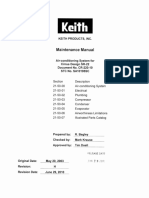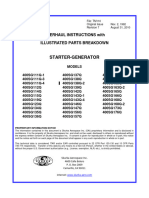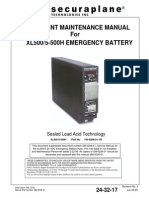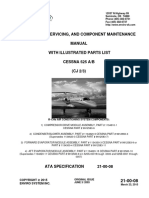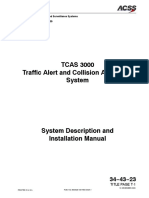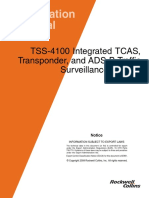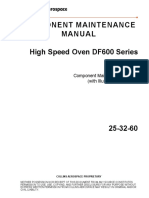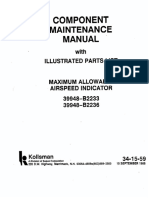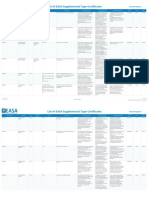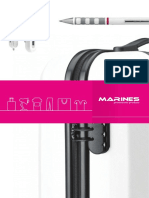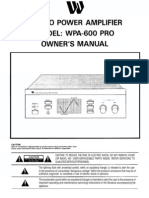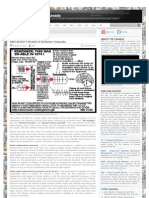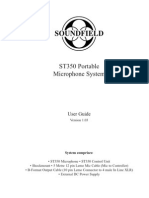Equipment Manual: Product Functional Specifications and Installation Manual
Equipment Manual: Product Functional Specifications and Installation Manual
Uploaded by
GeeCopyright:
Available Formats
Equipment Manual: Product Functional Specifications and Installation Manual
Equipment Manual: Product Functional Specifications and Installation Manual
Uploaded by
GeeOriginal Description:
Original Title
Copyright
Available Formats
Share this document
Did you find this document useful?
Is this content inappropriate?
Copyright:
Available Formats
Equipment Manual: Product Functional Specifications and Installation Manual
Equipment Manual: Product Functional Specifications and Installation Manual
Uploaded by
GeeCopyright:
Available Formats
DOCUMENT NUMBER 438-16-1 REVISION 1.
05
EQUIPMENT MANUAL
Product Functional Specifications
and Installation Manual
AUDIO CONTROL AMPLIFIER
MODEL 438-[ ]
AND
ALL DETAIL PART NUMBERS
2011.01.17
SEALED 13:05:17
-08'00'
IMPORTANT NOTICE
Chelton Avionics Inc. doing business as
Wulfsberg Electronics Inc. doing business
as Cobham Avionics will be responsible
for full distribution and revisions of ICA's
(Instructions for Continued Airworthiness).
CONFIDENTIAL AND PROPRIETARY TO COBHAM
EQUIPMENT MANUAL 438-16-1 REV 1.05
CHANGE RECORD
DATE CHANGE CHECK APPROVAL
2-21-06 ORIGINAL DOCUMENT RELEASED SF AP
Revision A:
Added dB Systems reference paragraph and TSO
6-5-06 approved performance standards paragraph to SF AP
Section 1.0, Operating Instructions and Equipment
Limitation (paragraphs 1 & 2) (Type IV).
Revision B:
Added document “438-16-2 for ITAR controlled
models” and “438-4-1 for ITAR controlled models –
Section 4.0, Calibration Test Procedures (first and
second paragraphs).
Corrected typos:
“Refer to Environmental Qualification Form, Table
6-7-06 SF AP
4” was “Table 2”.
Unit Connector, Part No. for P50 (50-pin) was
“MD50M4BOV3O” – is now “MD50M4BOV30”
(zero) – Table 2, Mating Connectors.
Document “438-16-1” was “438-16” – Table 4,
Environmental Qualification Form.
(Type IV)
Revision 1.03:
Incorp ECR1 438-16:
10-23-08 SC AP
Updated Figure 1 to latest issue (includes 438—
007 and 438-008); Updated Figure 3 to latest
issue. Updated document format to NAT standard.
Revision 1.04:
6-26-09 Incorp ECR1 438-16-1: ZP AP
Added Detail Part Number Description table.
Zack
Revision 1.05: Pahl
man
SEE TITLE Incorp. ECR2 438-16. Updated Figure 1, outline, to Scot
Ford
2011.
01.17
2011.01.
PAGE current rev. Added ICA responsibility notice. 14
17:37:14
11:52
:07
Cobham was NAT Seattle. Geoff Melton
2011.01.13
-08'00'
-08'0
11:17:00 0'
-08'00'
438/438-16-1 CONFIDENTIAL AND PROPRIETARY TO COBHAM Page a
EQUIPMENT MANUAL 438-16-1 REV 1.05
TABLE OF CONTENTS
Page
1.0 OPERATING INSTRUCTION AND EQUIPMENT LIMITATIONS......................................1
2.0 SPECIFICATIONS .............................................................................................................3
2.1 Physical .......................................................................................................................6
2.2 Electrical ......................................................................................................................6
3.0 PIN IDENTIFICATION........................................................................................................8
4.0 CALIBRATION AND TEST PROCEDURES ......................................................................15
Tables
Table 1. Model 438 Operating Modes ......................................................................................2
Table 2. Model 438 Detail Part Number Descriptions...............................................................2
Table 3. Mating Connectors .....................................................................................................6
Table 4. Connector Pin Identification........................................................................................8
Table 5. Environmental Qualification Form ..............................................................................17
Figures
Figure 1. Outline, Model 438-[ ] Audio Control Amplifier ........................................................7
Figure 2. Wiring Diagram .........................................................................................................9
Figure 3. Model 438 Block Diagram .........................................................................................14
438/438-16-1 CONFIDENTIAL AND PROPRIETARY TO COBHAM Page b
EQUIPMENT MANUAL 438-16-1 REV 1.05
EQUIPMENT MANUAL
MODEL 438-[ ]
1.0 OPERATING INSTRUCTIONS AND EQUIPMENT LIMITATIONS
This document makes references to dB Systems, Inc. and NAT Seattle, Inc. Please note that
dB Systems, Inc. and NAT Seattle, Inc. have been changed to Cobham. For all references to
dB Systems, Inc. or NAT Seattle, Inc. herein, substitute Cobham.
The Model 438-[ ] Audio Control Amplifier is a remotely controlled, electronic unit which
operates upon command from switches and potentiometers in the cockpit. The Model 438-[ ]
is capable of switching and separately controlling the volume for up to 12 receiver inputs. It
also switches five sidetone inputs and an interphone line. In addition, two unswitches and
unmuted inputs are provided to accommodate an aural warning input and an auxiliary input.
Headphone and selected speaker outputs are isolated and a cockpit voice recorder (CVR)
output is provided from the headphone and interphone microphone audio. Microphone audio
can be recorded on the cockpit voice recorder at all times with the Model 438-[ ] (e.g., the
interphone microphone to CVR audio channel is unswitched and unmuted). A Pilot Select
COMM output (PSC) produces a summation of COMM1 through COMM 4, DME 1 and 2, and
the MKR 1 and 2 receiver inputs and is compatible with the Model 240, 250, or 251 PSC audio
input channel (or equivalent). PSC allows passengers to hear pilot selected audio if desired.
The speaker channel is powered through an internal fuse, separate from the headphone
channel so that a failure of the speaker channel will not disable the headphone channel.
Receiver and operating modes are electronically switched. Ground signals, applied by manual
switches in the cockpit, enable the electronic switches in the Model 438-[ ]. An electronic
attenuator is employed in each of the 12 receiver input channels. Every receiver input
attenuator has approximately 30 dB of range and is controlled by a volume control
potentiometer in the cockpit. Zero to 1K ohm linear taper pots are required for each volume
receiver control (maximum volume with maximum resistance).
Selective voice or code filtering is provided on four of the receiver audio inputs, intended for
ADF and NAV audio. The filter function is electronically controlled by ground signals from the
cockpit Voice-Off-Indent switch.
A Voice Activated switch is incorporated, in series with the microphone input, to reduce
interphone noise. This feature allows Hot Interphone operation without ambient noise being
coupled into the amplifier when the pilot is not talking. The threshold of voice activations may
be adjusted by an internal potentiometer screwdriver adjustment. It is factory set at 100
millivolts and adjustable from 15 to 350 millivolts. A 0 to 10K ohm external VOX threshold
potentiometer can be connected (maximum threshold with minimum resistance).
Operating modes of the Model 438-[ ] are listed in Table 1 and are established when a ground
signal is applied to the connector pin listed.
The conditions and tests required for TSO approval of this article are minimum performance
standards. It is the responsibility of those installing this article either on or within a specific type
or class of aircraft to determine that the aircraft installation conditions are within the TSO
standards. TSO articles must have separate approval for installation in an aircraft. The article
may be installed only if performed under 14 CFR part 43 or the applicable airworthiness
requirements.
438/438-16-1 CONFIDENTIAL AND PROPRIETARY TO COBHAM Page 1
EQUIPMENT MANUAL 438-16-1 REV 1.05
Table 1. Model 438-[ ] Operating Modes
Pin No. Identification Function
P40-18 Speaker Switch Connects selected audio to the cockpit speaker.
P40-6 INPH Hot Switch Connects microphone input to the interphone line if
PTT is not selected.
P40-14 INPH to SPKR Switch Connects interphone audio to cockpit speaker if
SPKR is selected.
P40-16 PTT Switch Opens the microphone to interphone circuit and the
interphone to headphone circuit and mutes the
speaker audio.
P40-11 Voice Switch Enables notch filter to reject Ident Tone on NAV and
ADF audio inputs.
P40-12 Ident Switch Enables bandpass filter to emphasize Ident Tone.
P50-6, 7, 9, 10, Receiver Switches Connects selected receiver audio to the internal
11, 12, 13, 23, 24, attenuating, mixing, filtering, and amplifying
27, 28, 29 circuitry.
P50-22 PA Key Connects PA sidetone input to the headphones,
CVR, and cockpit speaker (if SPKR is selected).
Table 2. Model 438-[ ] Detail Part Number Descriptions
Detail Part Number Description of Detail
Base Model No differences.
001 Provides a higher SPKR, lower HDPH AW/AUX than the base model.
002 Provides different listening levels than the base model. Receiver and
sidetone audio output levels are 40 mW. Substitute (from base model)
3.00 VRMS SDTN to HDPH output, 2.30 VRMS COMM, MKR 1, 2, and DME
1, 2 to HDPH outputs.
003 Provides interphone operating levels for 8-station interphone system (37-
ohm interphone line). This unit provides more interphone audio to the
speaker and headphone than the base model, and increases the receiver
levels to compensate for increased load on the receivers by multistation
Model 438’s.
004 Custom calibration for a 5 station interphone system (60-ohm interphone
line).
005 Custom configuration for a 7 station interphone system (16-ohm
interphone line) that uses Model 907 Audio Switching Unit to control
interphone line connections between the stations. The receiver levels are
also increased to compensate for the receiver levels are also increased to
compensate for the increased load on the receivers by the multistation
Model 438’s. The AUX input is used for the interphone input and the
INPH OUT is used for interphone output (no input).
438/438-16-1 CONFIDENTIAL AND PROPRIETARY TO COBHAM Page 2
EQUIPMENT MANUAL 438-16-1 REV 1.05
Table 2. Model 438-[ ] Detail Part Number Descriptions (Continued)
Detail Part Number Description of Detail
006 Provides a 2.7dB lower SPKR AW/AUX level than the base model.
007 Provides interphone operating levels for 4-station interphone system (75-
ohm interphone line). This unit provides more interphone audio to the
speaker and headphone than the base model, and increases the receiver
levels to compensate for increased load on the receivers by multistation
Model 438’s.
008 Provides interphone operating levels for 4-station interphone system (75-
ohm interphone line). This unit provides more interphone audio to the
speaker and headphone than the base model, and increases the receiver
levels to compensate for increased load on the receivers by multistation
Model 438’s.
Three separate electronic attenuators are employed in the Model 438-[ ] for audio master
volume control. One of them controls the level for both the headphone and speaker audio,
another controls the level for XMT and PA sidetone audio, and another controls the interphone
audio level. All three master attenuators have approximately 30 dB of range, controlled by
volume control potentiometers in the cockpit. Zero to 10,000 ohm linear taper pots are required
(maximum volume with maximum resistance).
All outputs (including the headphone and speaker outputs) of the Model 438-[ ] are open and
short circuit protected.
The speaker amplifier in the Model 438-[ ] is rated at 10 Watts into 4 ohms. This is a peak
rating intended for speech and music. The continuous rating of the amplifier is 1 Watt into 4
ohms for sine wave operation.
All internal screwdriver potentiometer adjustments of the Model 438-[ ] are set to factory
standards. If it is necessary to change a setting, refer to the calibration section of the
Acceptance Test Procedure, Document No. 438-4.
The amplifiers are adjusted for acceptable listening output levels into the proper loads with
receiver inputs of 7.75 volts RMS. This input level is realized when receivers are set for 100
milliwatts into 600 ohms. If 7.75 volts RMS is greatly exceeded at the inputs, the audio will
become distorted due to peak clipping and audio bleedthrough will be noticed. The amplifiers
will not be damaged however.
An important feature of the Model 438-[ ] is the Emergency Mode of Operation. The Model
438-[ ] automatically goes into this mode when the supply power to the unit is interrupted. In
the case of a critical electronic failure within the unit, the Emergency Mode of Operation can be
implemented by opening the switch (EMERGENCY switch) normally connecting pins P40-9 and
P40-3. In the Emergency Mode of Operation, the audio selected from COMM1 and 2, SDTN 1
and 2, and AURAL WARNING inputs is passed directly to the headphone output with 23 dB of
attenuation into 150 ohm headphone load.
438/438-16-1 CONFIDENTIAL AND PROPRIETARY TO COBHAM Page 3
EQUIPMENT MANUAL 438-16-1 REV 1.05
2.0 SPECIFICATIONS
The Model 438-[ ] is intended for airplanes with two cockpit audio stations. Two Model
438-[ ] amplifiers are installed, one for each audio station. The receiver outputs are connected
to both Model 438-[ ] receiver inputs. The receiver input impedance of the Model 438-[ ] is
2,000 ohms so when the two specifications are installed, the receiver sees 1,000 ohms. Input
specifications are expressed in volts RMS, rather than milliwatts, to avoid any misunderstanding
INPUTS:
COMM: 4 dual audio inputs for receiver and sidetone. Receiver inputs level is 7.75 VRMS
and sidetone is 3.9 VRMS, both switched simultaneously.
PA SDTN: This is a switched audio input compatible with the PA sidetone output of Model
240, 250, 251 (or equivalent), which provides a 2.00 VRMS audio sidetone signal
produced from MIC (PA) to cabin paging.
438/438-16-1 CONFIDENTIAL AND PROPRIETARY TO COBHAM Page 4
EQUIPMENT MANUAL 438-16-1 REV 1.05
RCVR: 4 signal, switched audio inputs for MKR, DME, etc. Input level is 7.75 VRMS.
MIC: The microphone input, used for interphone mode, supplies bias and is
compatible with carbon and amplified dynamic microphones. Voice activated
within 1.5 milliseconds by a circuit which provides 30dB minimum attenuation
within 2 seconds after speech (15 to 350 millivolt threshold range). Microphone
audio from this input is channeled directly to the CVR output amplifier. If
interface to low impedance microphones is desired, use Model 213 or Model
263 microphone amplifier.
FLTR: 4 single, switched audio inputs for NAV, ADF, etc. 7.75 VRMS inputs have
selected filtering, switched by the Voice-Off-Ident switch.
Voice: 1,020 +5 Hz, 30 dB 100 Hz notch
Off: No filtering; normal bandwidth operation
Ident: 1,020, +5 Hz Ident; Tone emphasis
AUX: 1 unswitched and unmuted auxiliary input, factory set to
accommodate 1.00 VRMS. An internal potentiometer screwdriver
adjustment may be changed for higher or lower auxiliary levels.
AW: This is an unswitched and unmuted input compatible with the aural
warning output of Model 630 (or equivalent), which provides aural
warning tones.
MASTER VOLUME: Controls level of all 12 receiver audio inputs to the speaker,
headphone, and cockpit voice recorder outputs. Volume control
range is 30 dB (minimum) controlled by a 10,000 ohm 1/2 Watt,
linear taper pot. Maximum volume is with maximum resistance.
SIDETONE VOLUME: Controls level of all 5 sidetone audio inputs to the speaker,
headphone, and cockpit voice recorder outputs. Range and control
same as MASTER VOLUME specification.
INTERPHONE VOLUME: Controls level of interphone audio input to the speaker, headphone,
and cockpit voice recorder outputs. Range and control same as
MASTER VOLUME specification.
RECEIVER VOLUME: (One electronic attenuator per receiver input). Controls level of the
respective receiver audio input before subject to control of the
MASTER VOLUME electronic attentuator. Volume control range is
25 dB (minimum) controlled by a 1K ohm (500 ohm for two Model
438-[ ] amplifiers connected in parallel), 1/2 Watt, linear taper pot.
Maximum volume is with maximum resistance.
OUTPUTS:
SPEAKER: The speaker amplifier is designed for speech signals and has both
a Rated Power and a Continuous Power specification. The
continuous rating is the power the amplifier can continuously deliver
with a sine wave. The Rated Power is the peak power it can deliver
438/438-16-1 CONFIDENTIAL AND PROPRIETARY TO COBHAM Page 5
EQUIPMENT MANUAL 438-16-1 REV 1.05
without clipping. Bench testing and adjustment may require brief
periods of sine wave operation above the continuous rating; those
periods should be limited to 1 minute to prevent amplifier damage.
Load Rated Power Continuous Power
4 ohm 10 Watts 1 Watt
8 ohm 8 Watts 0.8 Watt
HEADPHONE: The headphone amplifier has a Rated Power specification of 107
milliwatts into 150 ohms and a Continuous Power specification of
27 milliwatts into 150 ohms (1 Watt into 8 ohms for Model 438
MOD D and above).
COCKPIT VOICE
RECORDER: The CVR will deliver 1.7 milliwatts into 600 ohms continuously.
Rated and continuous power ratings are the same.
PILOT COMM: This Pilot Select COMM output will deliver 1.7 milliwatts into 600
ohms continuously. Rated and continuous power ratings are the
same.
INTERPHONE: The INPH output will deliver 1.5 milliwatts into 430 ohms
continuously. Rated and continuous power are the same.
FREQUENCY
RESPONSE: Flat within 3 dB from 350 Hz to 6,000 Hz.
HARMONIC
DISTORTION: Less than 3 percent distortion, all outputs
ISOLATION BETWEEN
CHANNELS: 60 dB
OUTPUT NOISE: Greater than 55 dB below rated, all outputs.
POWER SUPPLY: 28 VDC, 1 ampere maximum
OPERATING
TEMPERATURE: From –55 to +70 degrees C.
OPERATING ALTITUDE: To 70,000 feet.
QUALIFIED TO:
FAR PART 21, TSO-C50c
RTCA DO-160B: Refer to Environmental Qualification Form, Table 4.
438/438-16-1 CONFIDENTIAL AND PROPRIETARY TO COBHAM Page 6
EQUIPMENT MANUAL 438-16-1 REV 1.05
2.1 Physical
Installation dimensions are shown on the Model 438-[ ] outline drawing (Figure 1). The
amplifier enclosure is designed for installation in a King rack assembly no. 071-4004-00. The
unit and rack assembly can be mounted in any position compatible with the rack assembly
because the unit fits into the rack assembly in only one position. No shock or vibration isolators
are required.
The Model 438-[ ] and the rack assembly can be mounted to a metal or plastic surface, but is
necessary to ground the case to the metal aircraft structure. When mounting to a plastic
surface, use a grounding strap. The case is finished with an electrically conductive film so it is
not necessary to remove the film for electrical bonding.
2.2 Electrical
Connections to the Model 438-[ ] are made through two “D” subminiature connectors. Each
mating connector manufactured by Positronic Industries, Inc. has part numbers for the
complete connector assembly. The part numbers are listed below.
Table 3. Mating Connectors
CONNECTOR KITS WITH POSITRONIC V-LOCK SYSTEM
Connector Unit Connector Mating Connector Contacts
Part No. Part No. Part No.
P40 (37-pin) POSITRONIC POSITRONIC SUPPLIED
RD37F10JVLO WITH MATING
MD37M4BOV30
USE MS22520/2-01 CRIMP TOOL, CONNECTOR
POSITIONER 2-08
P50 (50-pin) POSITRONIC POSITRONIC RD50F10JVLO SUPPLIED
USE MS22520/2-01 CRIMP TOOL, WITH MATING
MD50M4BOV30
POSITIONER 2-08 CONNECTOR
Numeric pin identification and wiring diagrams are shown in Section 3.0. Shielded wire must be
used where indicated on the diagrams. AWG 24-26 size wire should be used for all
connections except those to the input power, power ground, and speaker amplifier output where
AWG 20-22 size should be used at pins 8, 10, 35, and 37 of P40.
The control switches shown will switch low current loads and should have a DC rating of 28
VDC. Typical switches for this application include Alco MTA series.
The 12 receiver volume control pots required (one each for both Model 438-[ ] amplifiers) are
linear taper, zero to 1,000 ohms (500 ohms when two 438’s are connected in parallel), 1/2 Watt
or greater. The Master, Sidetone, and Interphone volume control pots required are linear taper,
zero to 10,000 ohms, 1/2 Watt or greater. Electrically, the pots are wired to provide maximum
resistance to the Model 438-[ ] for full volume (fully clockwise rotation).
438/438-16-1 CONFIDENTIAL AND PROPRIETARY TO COBHAM Page 7
EQUIPMENT MANUAL 438-16-1 REV 1.05
NOTES:
1. THE ENCLOSURE IS FABRICATED FROM 0.062 THK
ALUMINUM ALLOY CHROMATE CONVERSION
TREATED TO PREVENT CORROSION AND
PROVIDE ELECTRICAL BONDING.
2. LABEL INFORMATION AND OTHER
MARKINGS ARE PERMANENTLY PRINTED.
3. THE MODEL 438-XXX MAY BE MOUNTED IN
ANY POSITION. IT IS DESIGNED FOR
INSTALLATION IN KING RACK ASSEMBLY
NO: 071-4004-00.
4. TOLERANCE: DIMENSIONS WITHIN 0.030.
5. TEST SPECIFICATIONS: TSO-C50c, REFER TO
EQUIPMENT MANUAL 438-16 FOR ENVIRONMENTAL
QUALIFICATION FORM PER RTCA DO-160B.
6. POWER: 28VDC, 0.25 AMPERE NOMINAL,
1.5 AMPERE MAXIMUM.
7. THE MODEL 438-XXX IS IDENTICAL TO
THE MODEL 418 EXCEPT MICROPHONE IS
CONNECTED TO VOICE RECORDER OUTPUT
AT ALL TIMES AND IT HAS EXTENDED VOICE
ACTIVATED SWITCH THRESHOLD RANGE.
8. REFERENCE DRAWINGS:
438-8 QUAL TEST REPORT
438-16 EQUIPMENT MANUAL
9. WEIGHT MODEL 438-XXX:
MOD A, B & C: 2.0 lbs
MOD D, E & F: 1.6 lbs 11. THE APPLICABLE DETAIL PART NUMBER (e.g. "001" FOR DETAIL P/N 001) IS PRINTED IN THE DETAIL
BLOCK ON THE LABEL, OR THE DETAIL BLOCK IS LEFT BLANK IN THE CASE WHERE THERE IS
NO ASSOCIATED DETAIL PART NUMBER. REFER TO BUILD STANDARD FOR MOD STATUS.
10. THE MODEL 438-XXX PROVIDES ELECTRONIC AUDIO
CONTROL FOR ONE PILOT STATION. AUDIO INPUTS: 4
TRANSCEIVER WITH SIDETONE, 8 RECEIVER, PA
SIDETONE, UNSWITCHED AND UNMUTED INPUTS FOR
AURAL WARNING AND AUXILIARY, VOICE ACTIVATED
MICROPHONE AND AN INTERPHONE LINE. INPUTS ARE
ISOLATED, MIXED, FILTERED AND AVAILABLE TO THE
SELECTED AUDIO OUTPUT. OUTPUTS: HEADPHONE,
SPEAKER, INTERPHONE, VOICE RECORDER AND PILOT
SELECTED COM AUDIO. ELECTRONIC ATTENUATORS ARE
PROVIDED FOR REMOTE VOLUME CONTROL OF ALL
SWITCHED INPUTS AND OUTPUTS TO HEADPHONE AND
SPEAKER.
Figure 1. Outline, Model 438-[ ] Audio Control Amplifier
438/438-16-1 CONFIDENTIAL AND PROPRIETARY TO COBHAM Page 8
EQUIPMENT MANUAL 438-16-1 REV 1.05
3.0 PIN IDENTIFICATION
Table 4. Connector Pin Identification
P40 (37-pin connector)
1 INPH SQUELCH (see pin 25) 20 INPH VOLUME
2 MIC HI 21 MASTER VOLUME
3 EMERG CONTROL (see pin 9) 22 MIC LO
4 HDPH HI 23 HDPH LO
5 CVR HI 24 CVR LO
6 INPH HOT SWITCH 25 INTERNAL VAS POT (see pin 1)
7 INPH HI 26 INPH HI
8 28 VDC 27 AUDIO COMMON
9 28 VDC (ISOLATED, see pin 3) 28 AUDIO COMMON
10 POWER GROUND 29 AUDIO COMMON
11 VOICE SWITCH 30 AUDIO COMMON
12 IDENT SWITCH 31 AUDIO COMMON
13 no connection 32 AUDIO COMMON
14 INPH to SPKR SWITCH 33 AUDIO COMMON
15 no connection 34 AUDIO COMMON
16 PTT (MUTE) SWITCH 35 SPKR LO
17 no connection 36 PLT SEL COMM HI
18 SPKR SWITCH 37 SPKR HI
19 CHASSIS GROUND
P50 (50-pin connector)
1 PA SDTN 26 AUDIO COMMON
2 COMM 3 HI 27 NAV 1 SWITCH
3 COMM 2 HI 28 DME 2 SWITCH
4 COMM 2 SDTN 29 MKR 1 SWITCH
5 COMM 4 HI 30 MKR 1 HI
6 COMM 1 SWITCH 31 NAV 2 HI
7 COMM 3 SWITCH 32 NAV 1 HI
8 AUDIO COMMON 33 DME 2 HI
9 ADF 2 SWITCH 34 AUX AUDIO HI
10 ADF 1 SWITCH 35 AURAL WARN HI
11 NAV 2 SWITCH 36 COMM 3 VOLUME
12 MKR 2 SWITCH 37 COMM 4 VOLUME
13 DME 1 SWITCH 38 COMM 2 VOLUME
14 ADF 1 HI 39 DME 1 VOLUME
15 ADF 2 HI 40 COMM 1 VOLUME
16 MKR 2 HI 41 SDTN VOLUME
17 DME 1 HI 42 AUDIO COMMON
18 COMM 1 HI 43 AUDIO COMMON
19 COMM 1 SDTN 44 NAV 2 VOLUME
20 COMM 3 SDTN 45 NAV 1 VOLUME
21 COMM 4 SDTN 46 MKR 1 VOLUME
22 PA KEY 47 MKR 2 VOLUME
23 COMM 4 SWITCH 48 ADF 1 VOLUME
24 COMM 2 SWITCH 49 ADF 2 VOLUME
25 AUDIO COMMON 50 DME 2 VOLUME
438/438-16-1 CONFIDENTIAL AND PROPRIETARY TO COBHAM Page 9
EQUIPMENT MANUAL 438-16-1 REV 1.05
Figure 2. Wiring Diagram
438/438-16-1 CONFIDENTIAL AND PROPRIETARY TO COBHAM Page 10
EQUIPMENT MANUAL 438-16-1 REV 1.05
Figure 2. Wiring Diagram
(continued)
438/438-16-1 CONFIDENTIAL AND PROPRIETARY TO COBHAM Page 11
EQUIPMENT MANUAL 438-16-1 REV 1.05
Figure 2. Wiring Diagram
(continued)
438/438-16-1 CONFIDENTIAL AND PROPRIETARY TO COBHAM Page 12
EQUIPMENT MANUAL 438-16-1 REV 1.05
Figure 2. Wiring Diagram
(continued)
438/438-16-1 CONFIDENTIAL AND PROPRIETARY TO COBHAM Page 13
EQUIPMENT MANUAL 438-16-1 REV 1.05
Figure 2. Wiring Diagram
(continued)
438/438-16-1 CONFIDENTIAL AND PROPRIETARY TO COBHAM Page 14
EQUIPMENT MANUAL 438-16-1 REV 1.05
NOTES:
AURAL WARNING. 1. P50-XX REPRESENTS PIN NUMBERS OF THE 50 PIN
FROM 611 OR 630 AW GENERATOR P50-35 28VDC CHASSIS GND. D SUBMINIATURE CONNECTOR.
AUX INPUT P50-34 CW 2. P40-XX REPRESENTS PIN NUMBERS OF THE 37 PIN
AW INPH VOL.
P50-22 AUX PWR.GND. D SUBMINIATURE CONNECTOR.
P50-41 10K,LIN.
PA SDTN CW 3. P50-25 IS AUDIO COMMON FOR ALL RECEIVER
P50-1 FET SDTN VOICE MASTER NORM EMERG.
FROM 240, 250 OR 251 PA AMP INPUTS. COMMON TIE POINT SHOULD BE LOCATED
VOL. OFF VOL. AS NEAR AS POSSIBLE TO THE 438 AMPLIFIERS.
CW
COMM1 SDTN 10K, IDENT
10K,LIN.
SDTN HI P50-19 FET LIN.
XMT SDTN 4. ALL UNSHIELDED WIRES EXCEPT P40-3,8,9,10 & 19
ATTN MAY BE ENCLOSED IN A SINGLE CABLE.
RCVR HI COMM2 SDTN (30 AWG. MINIMUM)
P40-10
P40-19
P40-21
P40-20
P40-11
P40-12
P50-4 FET
P40-8
P40-9
P40-3
LO 5. REPRESENTS INTERNAL SCREWDRIVER
COMM3 SDTN P50-20 FET POTENTIOMETER ADJUSTMENT.
TYPICAL
XCVR COMM4 SDTN P50-21 FET
CONNECTION EMERG.
28VDC P40-13 SPARE
NAV1 P50-32 FET ATTN POWER 2KOHM
SUPPLY P40-15 SPARE
P50-27 COMM1
P50-45
FILTER COMM1 SDTN P40-17 SPARE
AND
NAV2 P50-31 FET ATTN REGULATOR COMM2
P50-11 COMM2 SDTN
P50-44 AW
ADF1 P50-14 FET ATTN SHOWN
P50-10 DE-ENERGIZED
P50-48 (EMERG. MODE)
VOICE/ FLTR
ADF2 P50-15 FET ATTN IDENT MASTER HDPH
FILTER 150-600 OHMS (NO MOD TO MOD C)
P50-9 ATTN AMPL. 8-600 OHMS (MOD D AND ABOVE)
P50-49
HDPH HEADPHONE
P50-18 FET ATTN
P50-6
P50-40 AUDIO CONTROL AMPLIFIER P40-4
COMM2 P50-3 FET ATTN MODEL 438 P40-23
P50-24
P50-38
COMM3 P50-2 FET ATTN CVR
TYPICAL P50-7 AMPL. P40-5 COCKPIT
RCVR P50-36
VOICE
CONNECTION INPH P40-24 RECORDER
COMM4 P50-5 FET ATTN MUTE ATTN
MKR1 P50-23 INTERPHONE
P40-7
HI P50-37 LINE
P40-26 TO CPLT 438
P50-30 FET ATTN
LO P50-29
P50-46 PSC PILOT SELECT
INPH INPH AMPL. P40-36 COMM.
TYPICAL CONTROL HEAD MKR2 P50-16 FET ATTN MUTE AMPL. TO MODEL 240, 250
VOLUME POT CONN. SW. OR 251. (NO
P50-12 CONN. FOR CPLT
CW 1K OHM,LIN. P50-47 DB 438).
SPKR
ON DME1 P50-17 ATTN
FET AMPL. P40-37 COCKPIT
TYPICAL RCVR. TO CPLT P50-13 10-30dB SPEAKER
SWITCH CONTROL DB 438 INPH MUTE SPKR SPKR
P50-39
SPKR SW. P40-35
4-8 OHMS
MUTE
DME2 P50-33 FET ATTN MIC
DC CONTROL CABLE P50-28 BIAS
S P50-50
CW
H 24 AWG (MIN)
P50-25 AUDIO COMMON VOICE
I
COMM1 (SEE NOTE 3) ACT.SW.
E 2
L 3
D 4
PA MIC P40-2 THLD
MIC
A TO 240, 250 OR 251 PA AMP P40-22
P40-27
P40-28
P40-29
P40-30
P40-31
P40-32
P40-33
P40-34
L
P40-25
P40-14
P40-18
P40-1
P40-6
L 1 P40-16
2 EXTERNAL JUMPER
3 THRESHOLD FOR INPH INPH SPKR
4 10K, LIN. INTERNAL HOT TO SW AUDIO LO's
P50-42
P50-43
P50-26
PTT
P50-8
PA KEY SPKR
TO 240, 250 OR 251 PA AMP SWITCH CW HOT
TO INTERFACE LOW
MIC SELECT IMPEDANCE MIC'S USE AUDIO LO's
FOR AUX, AW, ETC.
TO CPLT 438
MODEL 213 OR 263
Figure 3. MODEL 438 Block Diagram
438/438-16-1 CONFIDENTIAL AND PROPRIETARY TO COBHAM Page 15
EQUIPMENT MANUAL 438-16-1 REV 1.05
4.0 CALIBRATION AND TEST PROCEDURES
Calibration procedures are included in documents 438-4 and 438-4-1 (for ITAR controlled
models), Acceptance Test Procedure.
Schematics, PCB assembly drawings, and parts lists, are contained within document 438-16
and 438-16-2 (for ITAR controlled models) for purposes of troubleshooting and repair by the
factory.
No scheduled maintenance is required.
438/438-16-1 CONFIDENTIAL AND PROPRIETARY TO COBHAM Page 16
EQUIPMENT MANUAL 438-16-1 REV 1.05
Table 5. Environmental Qualification Form
NOMENCLATURE: AUDIO CONTROL AMPLIFIER
TYPE/MODEL/PART NO.: MODEL 438-[ ] TSO NUMBER: TSO-C50c
MANUFACTURERS SPECIFICATION AND/OR OTHER APPLICABLE SPECIFICATION:
Document No. 438-16-1, Equipment Manual
MANUFACTURER: NAT SEATTLE, INC.
ADDRESS: 22125 17TH AVE SE, SUITE 107, BOTHELL, WA 98021
DO-160B
Conditions Section/ Description of Conducted Tests
Paragraph
Temperature and altitude 4.0 Equipment meets requirements of Category F2
similarity to the Model 418 amplifier.
Low temperature 4.5.1 (see also temperature variation)
High temperature 4.5.3 (see also temperature variation)
.
Altitude 4.6.1
Temperature variation 5.0 Equipment meets requirements of Category B by
similarity to the Model 438 amplifier.
Humidity 6.0 Equipment meets requirements of Category A by
similarity to the Model 418 amplifier.
Operational shocks and 7.0
Crash safety Equipment meets requirements of DO-160B,
paragraphs 7.2.1, 7.3.1, 7.3.2, and 7.3.2.2 by
Operational shocks 7.2 similarity to the Model 418 amplifier.
Crash safety 7.3
Vibration 8.0 Equipment meets requirements (without shock
mounts) of Categories J, L, and O (DO-160B,
table 8-1) by similarity to the Model 418 amplifier.
Explosion proofness 9.0 Equipment identified as Category X, no test
required.
Waterproofness 10.0 Equipment identified as Category X, no test
required.
Fluids susceptibility 11.0 Equipment identified as Category X, no test
required.
Sand and dust 12.0 Equipment identified as Category X, no test
required.
Fungus resistance 13.0 Equipment identified as Category X, no test
required.
Salt spray 14.0 Equipment identified as Category X, no test
required.
438/438-16-1 CONFIDENTIAL AND PROPRIETARY TO COBHAM Page 17
EQUIPMENT MANUAL 438-16-1 REV 1.05
Table 5. Environmental Qualification Form
(continued)
TYPE/MODEL/PART NO.: MODEL 438-[ ]
DO-160B
Conditions Section/ Description of Conducted Tests
Paragraph
Magnetic effect 15.0 Equipment identifed as “X”, no test required.
Power input 16.0 Equipment qualified to Categories B and Z by
similarity to the Model 418.
Voltage spike 17.0 Equipment meets requirements of Category A
by similarity to the Model 418.
Audio frequency conducted 18.0 Equipment meets requirements of Category A
susceptibility by similarity to the Model 418.
Induced signal susceptibility 19.0 Equipment meets requirements of Category A
by similarity to the Model 418.
Radio frequency susceptibility 20.0 Equipment meets requirements of Category A
by similarity to the Model 418.
Emission of radio frequency energy 21.0 Equipment meets requirements of Category A
by similarity to the Model 418.
Lightning induced transient 22.0 Equipment meets requirements of Category L
susceptibility by similarity to the Model 418.
Lightning direct effects 23.0 Equipment identified as Category X, no test
required.
Icing 24.0 Equipment identified as Category X, no test
required.
Other Tests:
Acceptance Tests according to dB Systems Procedure 438-4 and performance tests in accordance with RTCA
Document DO-170, Appendix D were conducted to verify complete and proper operation of the Model 438
qualification test unit S/N 101. The Model 438-[ ] MOD D was tested to RTCA DO-214 and dB Systems
Procedure 438-4 to verify complete and proper operation of the Model 438 qualification test unit S/N 3069.
Remarks:
• Tests of DO-160B, Sections 4.0 (paragraphs 4.5.1 and 4.5.3), 5.0, 16.0, and 18.0 were conducted on the
Model 418 amplifier at dB Systems, Inc. in Redmond, Washington
• Tests of DO160B, Sections 4.0 (paragraph 4.6.1), 6.0, 7.0, 8.0, 17.0, 19.0, 20.0, and 21.0 were conducted on
the Model 418 amplifier at Sundstrand Data Control, Inc. in Redmond, Washington.
• Tests of D0-160B, Section 22.0 were conducted on the Model 418 amplifier at Beech Aircraft Corporation in
Wichita, Kansas.
• The Model 438-[ ] MOD D redesign was qualified by similarity to the Model 456-[ ] Audio Control Amplifier.
All tests conducted on the Model 456-[ ] are summarized in dB Systems Document No. 438-8 Appendix B.
• The Model 438-[ ] MOD D was retested to RTCA DO-160C sections 7.0 and 8.0 at Primex Aerospace in
Redmond, Washington. Section 8.0 category L was extended from 150Hz to 2000Hz. Section 7.2 was tested
to a level of 20g in 6 directions while operating.
438/438-16-1 CONFIDENTIAL AND PROPRIETARY TO COBHAM Page 18
You might also like
- Enviro 21-00-09rev13Document77 pagesEnviro 21-00-09rev13mrboogie390100% (1)
- CR 220 10Document76 pagesCR 220 10bruno_285035898No ratings yet
- Cessna 525A B - 00B9E8-MAN-21-00-08Rev21Document92 pagesCessna 525A B - 00B9E8-MAN-21-00-08Rev21Csaba Kohány100% (1)
- CMM Nose Wheel Assy LearDocument121 pagesCMM Nose Wheel Assy LearKornelius LülingNo ratings yet
- Component Maintenance Manual With Illustrated Parts List Main Brake AssemblyDocument128 pagesComponent Maintenance Manual With Illustrated Parts List Main Brake AssemblyCrobond6 KingNo ratings yet
- Rockwell - Collins Raytheon King Air With IFIS Avionics System Manual (523-0807237) Ed 1 Rev 2Document916 pagesRockwell - Collins Raytheon King Air With IFIS Avionics System Manual (523-0807237) Ed 1 Rev 2Chi Chan100% (1)
- Honeywell Primus 1000 Operating Manual A15-1146-096 Rev.001 (Citation 560XL)Document488 pagesHoneywell Primus 1000 Operating Manual A15-1146-096 Rev.001 (Citation 560XL)Wong BennyNo ratings yet
- Oscmm Pilatus Pc12 (R-134a) Ata 21-00-23 Rev 10Document89 pagesOscmm Pilatus Pc12 (R-134a) Ata 21-00-23 Rev 10mrboogie390No ratings yet
- Tfe731 5br IpcDocument1,018 pagesTfe731 5br IpcbrennaNo ratings yet
- sb11-101 Enviro CompressorDocument5 pagessb11-101 Enviro Compressoramal hassine100% (1)
- 1215 CIM ATA 24 50 05 Rev 13Document115 pages1215 CIM ATA 24 50 05 Rev 13Marcus Drago100% (1)
- Honeywell Rev 42 2007-06Document2,099 pagesHoneywell Rev 42 2007-06Gerardo Cordova33% (3)
- 400SG - SkurkaDocument195 pages400SG - SkurkaRICARDO ZAFRA100% (2)
- DME-4000 Installation and TuningDocument6 pagesDME-4000 Installation and TuningKKSNo ratings yet
- KMH 880/KTA 870: System Installation ManualDocument280 pagesKMH 880/KTA 870: System Installation ManualALEXANDER ROBLES100% (1)
- CMM Index-8 PDFDocument16 pagesCMM Index-8 PDFChandanNo ratings yet
- Audera User Manual AEP CAEPDocument89 pagesAudera User Manual AEP CAEPshel29No ratings yet
- Beech 400 Maintenace 2Document2 pagesBeech 400 Maintenace 2Jadder MeirelesNo ratings yet
- G1000 Nxi: System Maintenance ManualDocument135 pagesG1000 Nxi: System Maintenance ManualEric HenriqueNo ratings yet
- Honeywell Limit SwitchesDocument14 pagesHoneywell Limit SwitchesGeeNo ratings yet
- Install Operation Manual Comm 2000 Issue 04 82Document34 pagesInstall Operation Manual Comm 2000 Issue 04 82georgeclima4103100% (2)
- Component Maintenance Manual Cargo Hook Suspension SystemDocument30 pagesComponent Maintenance Manual Cargo Hook Suspension SystemAlireza Samavati.H100% (1)
- Chapter 00 Introduction PDFDocument100 pagesChapter 00 Introduction PDFIman GhNo ratings yet
- Flight Line Service Manual For Rate Based AutopilotsDocument115 pagesFlight Line Service Manual For Rate Based AutopilotsAdrian Todea100% (1)
- 24-32-17 CMM Secra Plane Emergency PackDocument53 pages24-32-17 CMM Secra Plane Emergency PackKumaraswamy RS100% (1)
- 118F 0000 ADocument586 pages118F 0000 Afarasuco100% (1)
- Wiring Diagram Manual: Beechcraft KING AIR 90, A90, 890, C90 E90Document6 pagesWiring Diagram Manual: Beechcraft KING AIR 90, A90, 890, C90 E90alejandro100% (1)
- Beckhoff FB1120 0 V10Document20 pagesBeckhoff FB1120 0 V10mikeNo ratings yet
- Mic Headset Aviation Bose A20 755-0029Document1 pageMic Headset Aviation Bose A20 755-0029Fredson SidileneNo ratings yet
- Pioneer X-EM11 Manual enDocument27 pagesPioneer X-EM11 Manual enDragan CavicNo ratings yet
- Flight Line Maintenance ManualDocument2,626 pagesFlight Line Maintenance ManualDmitriy Lapenko100% (3)
- Passenger Oxygen Mask - CMM - 35-24-04 Rev03 (20feb2018) - 240805 - 171532Document100 pagesPassenger Oxygen Mask - CMM - 35-24-04 Rev03 (20feb2018) - 240805 - 171532yzpvrdsn6j100% (1)
- Enviro MAN 21 00 08rev17Document85 pagesEnviro MAN 21 00 08rev17mguilbeaultNo ratings yet
- System Description and Installation ManualDocument102 pagesSystem Description and Installation ManualLuz Dary AvendañoNo ratings yet
- O-Level Instructions: 150SG122Q and 150SG122Q-4 Starter-GeneratorsDocument18 pagesO-Level Instructions: 150SG122Q and 150SG122Q-4 Starter-GeneratorsDouglas de Oliveira50% (2)
- Tcas 3000Document285 pagesTcas 3000Dima Hunt100% (1)
- Rockwell Collins TSS-4100 Integrated Surveillance System User Manual Manual 2 Rockwell CollinsDocument214 pagesRockwell Collins TSS-4100 Integrated Surveillance System User Manual Manual 2 Rockwell CollinsLeonNo ratings yet
- 22 05 09 PDFDocument429 pages22 05 09 PDFjosue jetavionicsNo ratings yet
- Automatic Flight Control System: Includes Instructions For Continued Airworthiness For STC SA01844WIDocument89 pagesAutomatic Flight Control System: Includes Instructions For Continued Airworthiness For STC SA01844WIaw139alexNo ratings yet
- SBFA2100CVR022Document16 pagesSBFA2100CVR022pathy_ame100% (1)
- ALX Series IPCDocument3 pagesALX Series IPCAnderson Ramalho100% (1)
- DPU-85N/86N/85R/86R/86S/85V Display Processor Unit and MPU-85N/86N/85R/86R/86S Multifunction Processor UnitDocument702 pagesDPU-85N/86N/85R/86R/86S/85V Display Processor Unit and MPU-85N/86N/85R/86R/86S Multifunction Processor UnitIndiomarcio GhelardiNo ratings yet
- GDC31 PDFDocument85 pagesGDC31 PDFGeeNo ratings yet
- ICA IS&S AltimeterADDU With FC531Document72 pagesICA IS&S AltimeterADDU With FC531Luciene OrecchioNo ratings yet
- Avionics Component Repairs Capabilities 2016Document70 pagesAvionics Component Repairs Capabilities 2016Adel KhelifiNo ratings yet
- Installation Bulletin: Bulletin No: 385 APPLICABLE TO: KAP 150 and KFC 150 Flight Control Systems SubjectDocument4 pagesInstallation Bulletin: Bulletin No: 385 APPLICABLE TO: KAP 150 and KFC 150 Flight Control Systems SubjectKumaraswamy RSNo ratings yet
- Rockwell Collins 400 Collins Road NE Cedar Rapids, IA 52498 319.295.1000Document190 pagesRockwell Collins 400 Collins Road NE Cedar Rapids, IA 52498 319.295.1000Carlos Silva100% (1)
- Lynx 0040-17001-01 - NGT-9000 - ImDocument248 pagesLynx 0040-17001-01 - NGT-9000 - ImJuan RodriguezNo ratings yet
- ASPEN Document 900-00012-001-T-EFD-ICADocument38 pagesASPEN Document 900-00012-001-T-EFD-ICALuis Antonio HermozaNo ratings yet
- CMM 25-32-60 Rev11Document228 pagesCMM 25-32-60 Rev11Accretia TechNo ratings yet
- ATP IndexDocument1,649 pagesATP IndexAlfredo Victor Calvagna100% (1)
- KHF 1050 Installation ManualDocument204 pagesKHF 1050 Installation ManualBoby1985No ratings yet
- KG 102 Rev 7Document131 pagesKG 102 Rev 7GusNo ratings yet
- 34 60 04rev3Document800 pages34 60 04rev3Silas AntoniolliNo ratings yet
- EASA 1st STC-List 20090702Document2,107 pagesEASA 1st STC-List 20090702Takács Krisztina75% (4)
- bmmsys55-55X-55SR-550 01Document78 pagesbmmsys55-55X-55SR-550 01Biblioteca Brasil AviationNo ratings yet
- Eliiot STC-Avionics-Installation-Part-2 PDFDocument19 pagesEliiot STC-Avionics-Installation-Part-2 PDFslam1212533% (3)
- CMD TDR 94d Strapping Aid Db1701001 Rev BDocument37 pagesCMD TDR 94d Strapping Aid Db1701001 Rev Bslam12125100% (2)
- Transponder Installation Manual: 190-00906-00 September, 2012 Revision HDocument85 pagesTransponder Installation Manual: 190-00906-00 September, 2012 Revision HJuan C BalderasNo ratings yet
- 34-15-59a PDF Component Maintenance ManualDocument110 pages34-15-59a PDF Component Maintenance ManualesedgarNo ratings yet
- Maintenance Manual: Honeywell Aerospace Electronics Systems P.O. Box 97001 Redmond, Washington 98073-9701 U.S.ADocument177 pagesMaintenance Manual: Honeywell Aerospace Electronics Systems P.O. Box 97001 Redmond, Washington 98073-9701 U.S.AMauricio Viveros100% (3)
- 190 01499 22 - A PDFDocument6 pages190 01499 22 - A PDFAndres GuerreroNo ratings yet
- AirspeedDocument9 pagesAirspeednabawi24No ratings yet
- Ats 638132700 001Document10 pagesAts 638132700 001GeeNo ratings yet
- Heat Shrink - HIXDocument1 pageHeat Shrink - HIXGeeNo ratings yet
- In/Mm 2:1: B-SIZE 172672Document2 pagesIn/Mm 2:1: B-SIZE 172672GeeNo ratings yet
- Both Terminal Orientations Are Acceptable.: In/Mm 4:1 0 0 0 0 0 0 0 0Document5 pagesBoth Terminal Orientations Are Acceptable.: In/Mm 4:1 0 0 0 0 0 0 0 0GeeNo ratings yet
- STUD SizesDocument1 pageSTUD SizesGeeNo ratings yet
- Crimp Housings-516155Document3 pagesCrimp Housings-516155GeeNo ratings yet
- 75P Clamp PCD 0Document6 pages75P Clamp PCD 0GeeNo ratings yet
- Amphenol Clamps and SupportsDocument32 pagesAmphenol Clamps and SupportsGeeNo ratings yet
- Crimp HousingsDocument2 pagesCrimp HousingsGeeNo ratings yet
- Solder Sleeves For Coax - B-044-22-NDocument2 pagesSolder Sleeves For Coax - B-044-22-NGeeNo ratings yet
- ENG DS 2361061-1 Te-Pclamp 0521Document6 pagesENG DS 2361061-1 Te-Pclamp 0521GeeNo ratings yet
- BULLETIN NO 21120 Rev ADocument4 pagesBULLETIN NO 21120 Rev AGeeNo ratings yet
- Flier - Voltage Converter ChartDocument1 pageFlier - Voltage Converter ChartGeeNo ratings yet
- 86P Brochure May 2021Document4 pages86P Brochure May 2021GeeNo ratings yet
- Terminal Junction Modules - CatalogDocument38 pagesTerminal Junction Modules - CatalogGeeNo ratings yet
- SkyNodeS200 120215343Document2 pagesSkyNodeS200 120215343GeeNo ratings yet
- Start Gen With 300 Amp GenDocument3 pagesStart Gen With 300 Amp GenGeeNo ratings yet
- Honeywell EN Roller-Plunger Install-InstructionsDocument2 pagesHoneywell EN Roller-Plunger Install-InstructionsGeeNo ratings yet
- 0500 - & ON B2000 - & ON: Artex Me-406 EltDocument2 pages0500 - & ON B2000 - & ON: Artex Me-406 EltGeeNo ratings yet
- List of EASA Supplemental Type CertificatesDocument1,655 pagesList of EASA Supplemental Type CertificatesGeeNo ratings yet
- Refer To Note 1: Electric Power Box Installation Nomenclature Effectivity Units PER Assy 1 2 3 4 5 6 7 From TODocument12 pagesRefer To Note 1: Electric Power Box Installation Nomenclature Effectivity Units PER Assy 1 2 3 4 5 6 7 From TOGeeNo ratings yet
- Artex Elt Main Wire AssyDocument2 pagesArtex Elt Main Wire AssyGeeNo ratings yet
- AC FittingsDocument2 pagesAC FittingsGeeNo ratings yet
- ME406 Series Emergency Locator Transmitter: Description, Operation, Installation and Maintenance ManualDocument74 pagesME406 Series Emergency Locator Transmitter: Description, Operation, Installation and Maintenance ManualGeeNo ratings yet
- User Guide: This is a 「User Guide」 installed on the TVDocument83 pagesUser Guide: This is a 「User Guide」 installed on the TVMarcelo VorpagelNo ratings yet
- AEC 207 Week 1Document11 pagesAEC 207 Week 1Ekemini SundayNo ratings yet
- JBL Quantum 600 Manual Original PDFDocument18 pagesJBL Quantum 600 Manual Original PDFrodattoNo ratings yet
- Looxcie LX2 - AndroidDocument37 pagesLooxcie LX2 - AndroidFernando Torres Galindo JrNo ratings yet
- M80 User ManualDocument1 pageM80 User ManualabcNo ratings yet
- Avantree Jogger Pro ManualDocument5 pagesAvantree Jogger Pro ManualCammille CarinanNo ratings yet
- Hisense 55A65H LED TelevisionDocument64 pagesHisense 55A65H LED TelevisionJuan Martín Navarro DueñasNo ratings yet
- Clipper Katalog 2020 Comp PDFDocument314 pagesClipper Katalog 2020 Comp PDFKristina VodopivecNo ratings yet
- Celviano AP-220 PDFDocument39 pagesCelviano AP-220 PDFandres ospinaNo ratings yet
- ORIVETI Bring Innovation in Audio Device IndustryDocument7 pagesORIVETI Bring Innovation in Audio Device IndustrylisternorivetiNo ratings yet
- Abelton EMP Course Workbook Updated August 2017 PDFDocument147 pagesAbelton EMP Course Workbook Updated August 2017 PDFMongezi MceluNo ratings yet
- PANDORAmini OM EFGS1 634359752549330000Document176 pagesPANDORAmini OM EFGS1 634359752549330000David PinhelNo ratings yet
- TCL Series D 32 Inch d3000 HD Led TV 32d3000Document15 pagesTCL Series D 32 Inch d3000 HD Led TV 32d3000Norjufri Nizar EdrusNo ratings yet
- Stereo Power Amplifier Model: Wpa-600 Pro Owner'S ManualDocument6 pagesStereo Power Amplifier Model: Wpa-600 Pro Owner'S ManualGay InkognitoNo ratings yet
- SynopsisDocument11 pagesSynopsisGuru D Rising SunNo ratings yet
- Heavy Duty Multipurpose Telephone Unit: Type HSB02Document13 pagesHeavy Duty Multipurpose Telephone Unit: Type HSB02advantage025No ratings yet
- ST 031 PiranhaDocument40 pagesST 031 PiranhasoluzionepaNo ratings yet
- AM768220 05 OG SoundSportWireless MLvoDocument534 pagesAM768220 05 OG SoundSportWireless MLvoEmail YouselfNo ratings yet
- Catalogo de MicrofonosDocument46 pagesCatalogo de MicrofonosEustasio Uaricha0% (1)
- Play AudiometryDocument5 pagesPlay AudiometryLubaba lubinpNo ratings yet
- IELTS Reading 1Document7 pagesIELTS Reading 1Ishtiaq Hasnat Chowdhury RatulNo ratings yet
- Tracer: PSB M4U 2 Headphone Failure and FixDocument5 pagesTracer: PSB M4U 2 Headphone Failure and FixDav J KellyNo ratings yet
- i.MX23, i.MX25, and i.MX28Document52 pagesi.MX23, i.MX25, and i.MX28samNo ratings yet
- Bộ Đề Mô Phỏng Đề Tn Thpt 2021: PronunciationDocument4 pagesBộ Đề Mô Phỏng Đề Tn Thpt 2021: PronunciationNguyễn DungNo ratings yet
- Organized Stalking Electronic Harassment - Allen Barker's Models of Synthetic Telepathy - Targetedindividualscanada-Wordpress-ComDocument27 pagesOrganized Stalking Electronic Harassment - Allen Barker's Models of Synthetic Telepathy - Targetedindividualscanada-Wordpress-ComKlaus-Dieter-Reichert100% (2)
- Crown Product Overview - FulllineDocument28 pagesCrown Product Overview - FulllineMaddy Sjiicro100% (1)
- St350 ManualDocument28 pagesSt350 ManualRicardo Cubillos PeñaNo ratings yet

